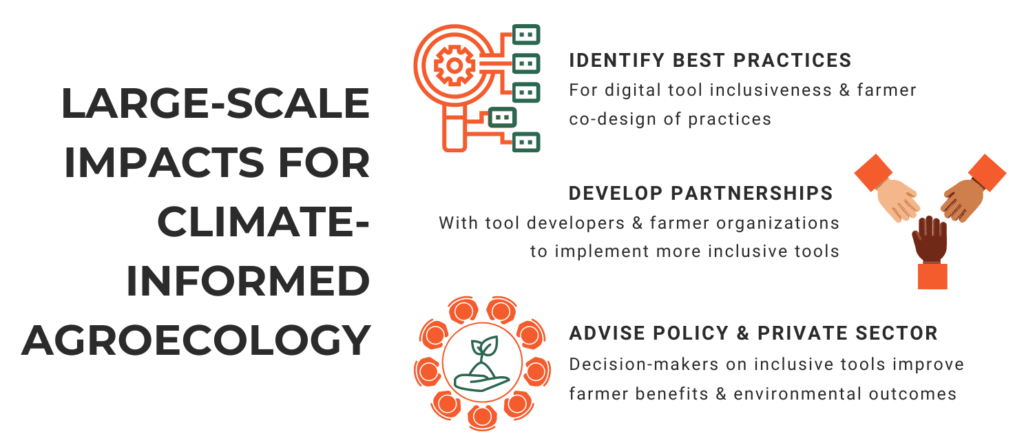See the recording here
Drawing on concrete case studies, this session explored the realities of applying digital tools in “last-mile” settings. It proposed alternative pathways for empowering women, smallholder farmers and other marginalized groups to build secure and resilient futures through digitalization.
Illegal logging and mining cause a breakdown in forest habitats and community livelihoods.Conventional approaches to monitoring and tackling illegal deforestation don’t always get to the root of the problem. Forest authorities lack the means to supervise and control resource extraction while many independent forest monitoring programmes depend on costly and inefficient field missions by international or national NGOs. Advances in satellite observation have transformed our ability to detect forest loss but may not show us what is causing it.Drawing on concrete case studies, this session explored the realities of applying digital tools in “last-mile” settings. It proposed alternative pathways for empowering women, smallholder farmers and other marginalized groups to build secure and resilient futures through digitalization.
Recording available here
- Moderation by Jes Weigelt, Head of Programmes, TMG Research
- Faith Alubbe CEO, Kenya Land Alliance
"Strengthening Community Land Rights’s primary objective is to provide technical legal support to strengthen community land and resource rights and then rigorously test the extent to which this mitigates and resolves local conflict. Kenya Land Alliance (KLA) supports communities gain legal protection for their community lands and through an action research approach will carefully track how this process affects local conflict and gender dynamics." - Ana Osuna Orozco, Head of Programmes, RainForest Foundation UK: Forestlink
programme: Real time community based forest monitoring - Crispino Lobo, Cofounder and Trustee, WOTR Centre for Resilience Studies, India
- Chloe Teevan, Head of Digitalization Workstream, ECDPM
"Horizon Europe, with its wider research ecosystem through research exchanges and co-creation can play a role in the development of the digital eco system." - Guy Faure, Senior Policy Officer, INTPA F3
"We are currently funding a project with the CGIAR to fund the use of digital tool to promote agro ecology" [see case study 3]
Case study 1: Forestlink programme
By engaging communities in the fight to tackle illegal logging, this programme seeks to strengthen their involvement in forest management using our innovative ForestLink technology. In this way, real time data from communities with local knowledge has made forest monitoring a more ‘bottom up’ and transparent process, and forest authorities in project countries have praised its contribution to improving forest governance.
- ForestLink has been deployed in DRC, Republic of Congo, Cameroon, Ghana, Cameroon, Liberia and Peru where hundreds of community monitors are generating thousands of illegal deforestation alerts to enhance detection and enforcement of illegal forest destruction.

- This system is reducing illegal logging and mining in the target areas, leading to seizures of illegal timber and equipment, landmark court cases, a better deal for communities from timber companies and territorial protection.
- The versatility of the system means it is also being used to monitor human rights violations, women's rights and wildlife crime and poaching.
By engaging communities in the fight to tackle illegal logging, our real-time monitoring project seeks to strengthen their involvement in forest protection and management. As of 2017, ForestLink is active in Cameroon, the Democratic Republic of Congo, Ghana and Peru.
- 4 Indian States
- 5 Languages
- 25+ Crops
- 50K+ Downloads
Case study 3: The TRANSITIONS’ Inclusive Digital Tools (ATDT) project - CGIAR’s Program on Agroecological Transitions for Building Resilient, Inclusive, Agricultural and Food Systems (TRANSITIONS)
Climate-informed agroecological transitions require a multi-faceted support to farmers, enabling them to shift to more sustainable agriculture production systems that increase food security while minimizing negative ecological and human impacts.
TRANSITIONS aims to enable climate-informed agroecological transitions by farmers at significant scales in LMICs through the development and adoption of:
TRANSITIONS aims to enable climate-informed agroecological transitions by farmers at significant scales in LMICs through the development and adoption of:
- Holistic metrics for food and agricultural systems performance
- Inclusive digital tools
Involving farmers in the co-design of knowledge is a key principle of agroecology. If digital platforms are to be a major driver for scaling up agroecology, it is essential to support more inclusive use of tools and co-design of practices by farmers to address needs in LMICs. The ATDT Project will evaluate how farmers benefit from using improved digital tools and their potential to generate large-scale impacts for climate-informed agroecology. - Traceable private-public sector incentives and investments for food systems.
Partners and Funding
Alliance of Bioversity International and the International Centre for Tropical Agriculture (CIAT)
University of Vermont & Gund Institute for Environment
CIFOR-ICRAF
Duration: 2021 - 2024
Funding: EU-IFAD
30 November 2022. In this informal expert workshop, the TRANSITIONS Inclusive Digital Tools (ATDT) project reviewed and received feedback from stakeholders and experts on proposed guidance for smallholder farmer’s inclusion and co-creation of farm practices for agroecology and climate change action. Invited participants included digital resource specialists, farmer-support organizations, and agroecology and climate change experts. In 2023, we will apply the principles with our action partners in Brazil and Vietnam to guide digital innovations. In the workshop we sought input to the relevance, coherence and usability of the proposed principles to guide future work. More on the ATDT Project: https://bit.ly/InclusiveDTsAlliance of Bioversity International and the International Centre for Tropical Agriculture (CIAT)
University of Vermont & Gund Institute for Environment
CIFOR-ICRAF
Duration: 2021 - 2024
Funding: EU-IFAD
- See presentation about: Civil Societies' critique about digital tools - through the lens of agro-ecology and small scale agriculture @8:40 - by Sadie Shelton (a literature review)
In 2023, ATDT will apply the principles with its action partners in Brazil and Vietnam to guide digital innovations.







No comments:
Post a Comment